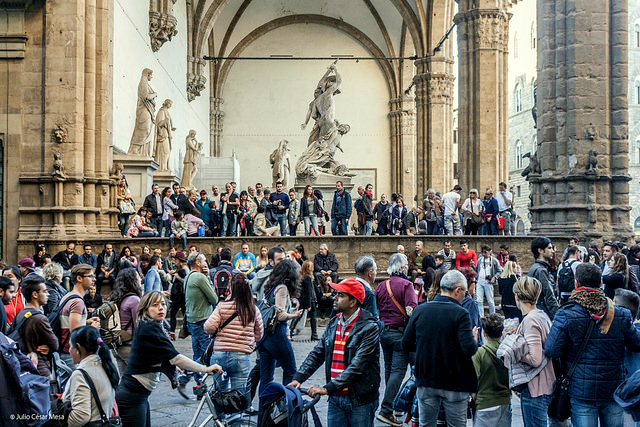Trovarsi = to find oneself, is a colloquial way of saying how you find/like something. That ‘something’ may refer to a place, a job, or an object. The easiest way to illustrate how we use trovarsi is through practical examples:
Domande = Questions
come ti trovi qua in Italia? = how do you (singular informal) like it here in Italy?
come si trova a Firenze, Sig. Bianchi? = how do you (singular formal) like Florence Mr. Bianchi?
come vi trovate con la vostra nuova macchina? = how do you (plural) find your new car?
come si trovano Giorgio e Marzia nel loro nuovo appartamento? = how do Giorgio and Marzia like their new apartment?

Non mi trovo molto bene a Firenze, ci sono troppi turisti. Photo CC by Julio César Mesa
Risposte = Replies
mi trovo benissimo qui in Italia = I really like it here in Italy
non mi trovo molto bene a Firenze, ci sono troppi turisti = I don’t really like Florence, there are too many tourists
ci troviamo bene con la macchina, è molto comoda = we like the car, it’s really comfortable
Giorgio e Marzia si trovano a loro agio nel loro nuovo appartamento = Giorgio and Marzia feel really at home in their new apartment
Alcune Risposte Alternative = Some Alternative Replies
Io sto bene qua in Italia = I feel good here in Italy
Firenze non mi piace molto, ci sono troppi turisti = I don’t like Florence very much, there are too many tourists
la nuova macchina la troviamo molto comoda = we find the new car very comfortable. N.B. in this case trovare is not reflexive as it refers to how we find the car and not how we find ourselves with the car
Giorgio e Marzia stanno da dio nel loro nuovo appartamento = Giorgio and Marzia love (literally: stay like gods) being in their new apartment. N.B. stare da dio (to be like a god) is more or less equivalent to essere al settimo cielo (to be in seventh heaven)
Il Passato = The Past
come ti sei trovato/a in Italia? = how did you like it in Italy?
come si è trovato a Firenze, Sig. Bianchi? = how did you find Florence Mr. Bianchi?
come vi siete trovati con la vostra nuova macchina? = how did you like your new car?
come si sono trovati Giorgio e Marzia nel loro nuovo appartamento? = How did Giorgio and Marzia like their new apartment?






Comments:
Thomas:
…”qua in Italia” and “qui in Italia”. I note both are used at the top? Any rhyme or reason with qua and qui? Thanks!
Geoff:
@Thomas Both mean ‘here’, as for rhyme or reason (what a nice expression that is), some people say that ‘qui’ indicates a more precise point than ‘qua’, but in everyday speech both variations are interchangeable, and we tend to use variation in order to avoid repetition. I actually switched from qua to qui to see if anyone would notice …. so well spotted!
A presto, Geoff 🙂
Transparent Language:
Comment received via email:
I am sure that you are told over and over again how helpful and well done your blog is, but………just wanted to add another
COMPLIMENTI per il lavoro svolto………
mi diverto sempre’ le vostre avventure’ o la lezione litaliana
Vi ringrazio ancora……Buona giornata
Will Morrissey Reno, Nv USA
Robin:
Ciao Geoff
Very helpful. Grazie mille.
Una domanda.
“ci troviamo bene con la macchina, è molto comoda” – in inglese si puo’ dire “we are happy with the car”? or is there another explaination for the use of “con” here? Is there a rule re. the usage? I understand a Firenze and in Italia because they are the right preps for a town/country, but I was confused by the “con” rather simply omitting it all together and writing “ci troviamo bene la macchina”.
Grazie in anticipo, Robin
Geoff:
@Robin Ciao Robin, I think you more or less answered your own question, quote: “….I was confused by the “con” rather simply omitting it all together and writing “ci troviamo bene la macchina”.”
If ‘ci troviamo bene con la macchina’ means ‘we are happy with the car’, then it follows that ‘ci troviamo bene la macchina’ would mean ‘we are happy the car’, which obviously doesn’t make any sense.
You’re right, prepositions can be very confusing in Italian, but in this case it’s a simple direct translation:’con’ = ‘with’.
A presto, Geoff